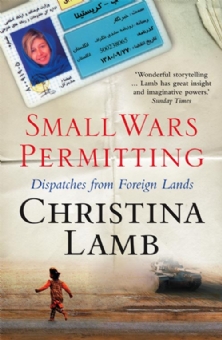By Amelie Sundberg
Lamb, Christina, Small Wars Permitting: Dispatches from Foreign Lands (London: HarperPress, 2008).
Paperback RRP: £8.99
Many of us who can’t seem to get enough of reading and writing about conflict are lured by the romanticized life of a war correspondent. Wouldn’t everyone like to travel to the far corners of the globe, witness history unfold itself in front of their eyes and in the process expose and vanquish the evils of our world by the stroke of our pen? The dream job. For me that is exactly what it has become – a dream, gathering dust in the face of other considerations such as a guaranteed decent wage and the reluctance to risk my life for an article that will be lining tomorrow’s dustbins. However, Christina Lamb’s Small Wars Permitting: Dispatches from Foreign Lands is a healthy dose of indulgence in the belief that maybe, one day, we could be as awe-inspiring as her.
Having won the Foreign Correspondent of the Year four times there is little doubt that Christina Lamb is a talented journalist. But after reading this book it is clear that she is also a surprisingly gifted storyteller. Personal memories are interspersed throughout this compilation of her reportage, chronicling not only her search for adventure but also her development as a writer with a concern for those whose everyday lives are disrupted by war. “To me the real story in war is not the bang-bang but the lives of those trying to survive behind the lines”(5).
Christina Lamb’s story begins in Pakistan. After attending Benazir Bhutto’s wedding in 1987 she managed to persuade the FT to let her return to Pakistan and pay her for whatever they published. She was only 21. Once there, in order to cover the Afghan resistance to Russian occupation Lamb smuggled herself into Afghanistan with the Mujahideen 14 times. She now felts that she fell in love with the Afghan war. It is difficult to not be impressed by the image of this English girl dining with Afghan tribesmen and riding on the back of Hamid Karzai’s motorbike. Clearly there is more to Christina Lamb’s book than the stereotypical journalistic bravado of hacks sipping whisky in exotic hotel lobbies.
As one of the few reporters to witness the battle for Jalalabad, Lamb is harrowed by the memory of driving past women and their injured children, who had mistaken her for a nurse, without offering to help. “It was the ugliest thing that I had ever done and made me realise what an ugly thing war is” (45). This exemplifies Lamb’s honest and modest writing style that sets her narrative apart. Many of her articles to follow dealt with untold issues of human rights and corruption. Forced to leave Pakistan in 1989 Lamb was later based in Brazil and South Africa. During this time, among many other issues she wrote about the murder of street children in Rio, Mugabe’s land reform and the oil curse of Nigeria.
After 9/11 Lamb was excited to return to Afghanistan to cover the Western ‘intervention’, but was quickly disillusioned by the regional destruction and oppression. Her tale of sewing-classes that acted as a cover for women’s education in Afghanistan is particularly enlightening. I was struck by how early on in the conflict Lamb voiced insights into the international political dynamics that many of us now only appreciate with the benefit of hindsight. In particular she criticises the ignorance of the US and British troops and holds that mistake as responsible for the escalating regional anti-Western sentiment.
Not only does Lamb open our eyes to the plight of others as a result of conflict in a candid and compassionate manner, she repeatedly demonstrates striking pluck and humour. One memorable scene takes place when journalists were stopped at the border into Iraq during the 2003 US invasion. Lamb managed to smuggle herself across by inserting her Land Cruiser in between a tank and APC, pretending to be part of the passing US convoy. One of the US vehicles was ironically named “Road to Paradise” (260). Still, two sobering events bring home the hardships that are part and parcel of her line of work. In 2006 she narrowly escaped death when the Taliban ambushed the British Parachute Regiment on a ‘Hearts and Mind’ mission in Afghanistan with whom she was reporting. And in 2007 she was on board Benazir Bhutto’s bus when it was bombed, luckily avoiding serious injury.
After reading Small Wars Permitting I have found myself a new heroine, and I am convinced that whoever reads her book will be cast under her spell. As for a career in journalism, I have to admit that I am quite relieved that I did not have to butter an inordinate number of sandwiches for my sons eleventh birthday party only hours after a close shave with death at the hands of the Taliban.
